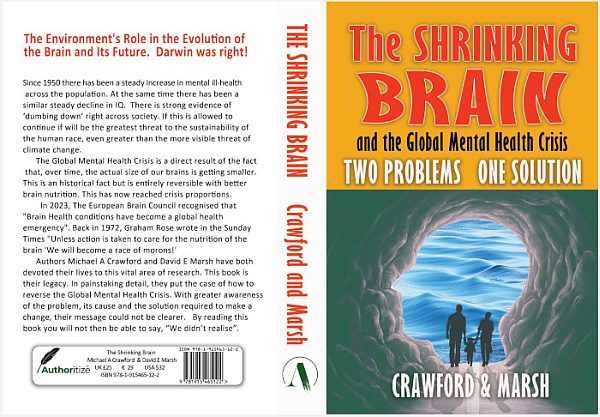The Shrinking Brain (book, 2023)

by Michael A Crawford and David E Marsh
Published October 2023
This book describes the role of the environment in the evolution of the brain, its recent decline and solutions for our children of the future.
The European Brain Council's Brain Awareness Week, March 2023 recognized the ill-health of the brain as "a global health emergency".
We have been writing about this since 1972*. c
This book is about the brain and its unique dependence on nutrition, which begins with its origin in the sea 500 million years ago when only marine nutrients were available. It is still dependent on the same marine nutrients, the lack of which explains the shrinking brain and escalation of mental ill-health.
We start with restoring Darwin’s writings on the imperative of the environment in evolution: a principle, savaged by August Weismann who cut off the tails of mice and when the next generation still had tails, claimed Darwin’s “environment” was irrelevant. This, like the cutting off of foreskins by his people, is mutilation with nothing to do with the environment.
Yet, it led to the neglect of the environment, a travesty from which we suffer today. The escalation of mental ill-health if allowed to continue is as great a threat to the sustainability of humanity as global warming. So we provide solutions to the action which is urgently needed. It is the future of our children and theirs which is at stake. *What We Eat Today, Michael; Sheilagh Crawford, 1972, SBN 85435 360 7. And 150 peer-reviewed scientific papers since.
We propose three solutions in our book:
(i) No government considers the needs of the brain in its food and agricultural policies. They have recommendations that favour protein and body growth which is counterproductive. The needs of the brain have to be prioritised as it is of greater relevance to us as Homo sapiens than body size.
(ii) Reversal of desertification and greening the desert. Desertification encroaches the semi-arid ecosystems. These have the potential for the development of agroforestry. which can produce food, including honey, nuts and oils and support meat and milk-producing animals which are adapted to hot dry climates. We have the eland in mind which have been domesticated.
(iii) Farming in the sea as in Japan and other places. 71% of the planet is covered in water. Only one-third of the 29% is arable unless we bring the semi-arid into production which would add another third. The benefits are remarkable and three-fold.
Firstly, helps fix climate change. The trees from agroforestry capture CO2. The kelp forests, phytoplankton. the microflora and some fauna including shellfish, sequestrate (capture) CO2.
Secondly, fertilize the land: Whilst kelp forests can provide food and habitat for hatchling fish, they also can be used as fertilizer to replenish farmland of trace elements lost by use over centuries.
Thirdly, sorts mental health. Providing DHA, iodine, and trace element-rich foods can reverse the escalation of mental ill-health, declining IQ and lead to brighter and healthier children.
The book also contains a section restoring Darwin's original thesis in which he saw the environment as the ruler of natural selection. This aspect was cut from history by falsehoods and self-serving interests resulting in the gene-centred paradigm. It is science-based.







